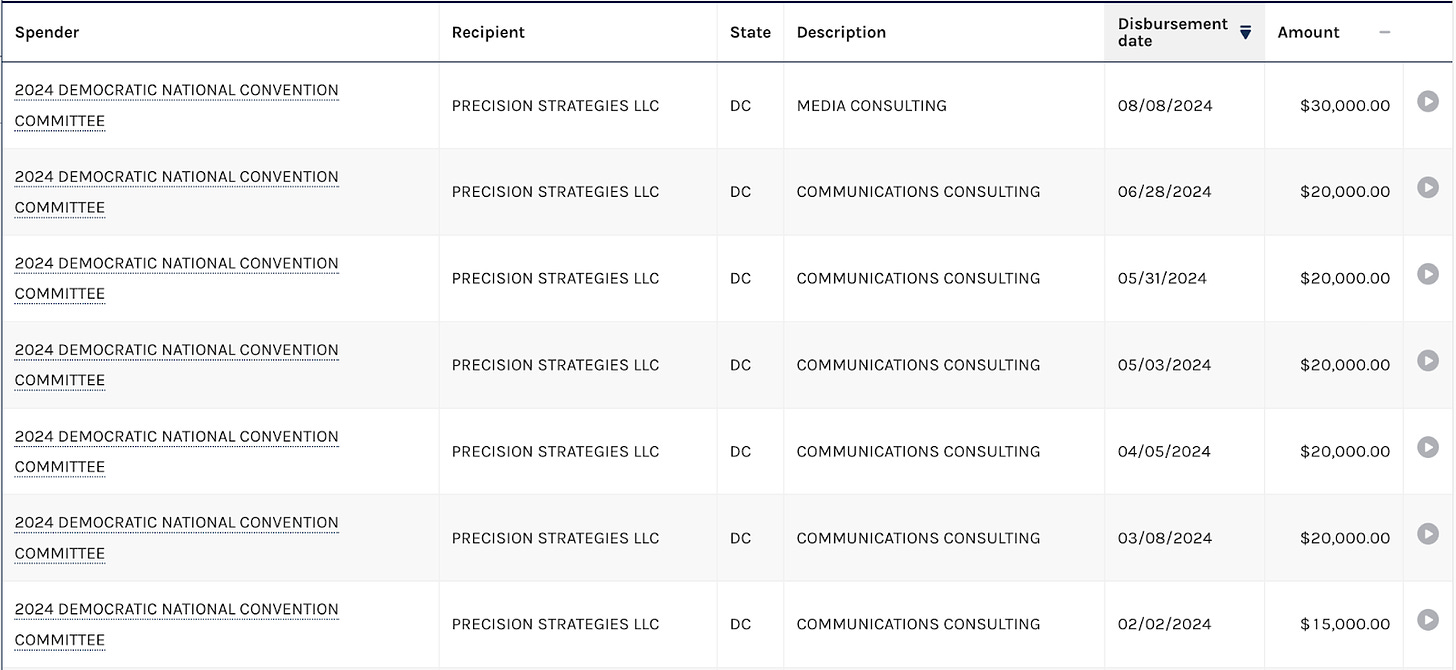Originally published by The Kennedy Beacon
There has been a renewed wave of scrutiny in recent weeks over Democratic presidential candidate Kamala Harris’s unlikely campaign – and the extent to which her party is shelling out fat paychecks to young influencers to spread the “Gospel of Kamala” to their thousands of followers.
Rather than earn the votes of her party, Harris benefitted from a last-minute swap-out with the support of the Democratic National Committee (DNC). She was handed the nomination in a late-night “virtual roll call” in lieu of having to earn the endorsement of primary voters.
Most legacy media outlets claim Harris won the September 10 debate on ABC, without highlighting the extent to which the moderators went easy on her and tough on her opponent, former president Trump.
Less known is the extent to which Harris and the DNC have relied on young social media influencers to gin up her support among voter groups not inclined to be enthusiastic about a candidate people still know little about.
The highest-profile example of this effort occurred during the 2024 Democratic National Convention in Chicago. On August 4, internet personality Dom Lucre went viral with allegations that the Harris campaign was paying celebrities and influencers to attend the convention. According to Lucre, public relations firms had been “paid by the campaign to inform celebrities and influencers that they can be compensated by the DNC,” along with flights, accommodation, and “exclusive invites to private parties and events.”
Matt Hill, senior communications director for the 2024 Democratic National Convention Committee (DNCC), quickly denied the allegations. “We are credentialing content creators the same way we credential media, and we do not pay either to cover our event.”
Despite this denial, a new review of federal filings and the Democratic Party’s own public statements suggest Hill’s denial is pure spin.
Indeed, the Democratic Party had previously announced that it was “welcoming credentialed content creators” to the 2024 DNC. For the first time ever, social media influencers could apply for prestigious media credentials formerly reserved for institutional media outlets – a novel effort ostensibly “to ensure more Americans than ever before can take part in the democratic process,” explained the video posted to X.
According to NPR, the DNC invited over 200 young social media “content creators,” many of whom were new to politics, in an effort to reach first-time Gen Z voters. These hand-picked youngsters were given the VIP treatment, per reporting from CNN, complete with an “exclusive lounge” and assigned campaign staff to escort them around the convention.
But this wasn’t the full picture. Just two days after Lucre published his allegations, CBS News ran a very similar story, stating that “Democratic organizations are flooding the creator community with cash and providing behind-the-scenes access.” The piece confirmed that the Harris campaign was actively working with said influencers, while funneling payments through “a constellation of other Democratic political organizations.”
One such influencer, Awa Saneh, was hired by several Democratic super PACs to create TikTok videos based on “their talking points,” a gig that she suggests can pay “from $3,000 to $10,000 and upwards.” Protect Our Care, one of the organizations that hired Saneh, is run by Brad Woodhouse, who previously worked as communications director for the DNC. Saneh confirmed that “her next stop is the Democratic National Convention, where she and other influencers [had] been invited to make more content.”
While some influencers reportedly paid their own way to Chicago, others received funding for their efforts from unnamed “sponsors and organizations” – perhaps among the aforementioned “constellation” of Democratic organizations – and, in at least some cases, this apparently included the DNC itself, per FEC data. For example, Edgar Vilchez, a 19-year-old anti-gun violence influencer from Chicago who delivered “brief remarks” at the event, received $2,760 in “stipend” payments, apparently associated with an internship he held with the DNCC.
Democratic Party-tied firms
According to CNN, mainstage events featuring these invited influencers were co-produced by Mia Logan, a senior vice president at Precision Strategies. A review of the most recent data from the FEC reveals that Precision has received over half a million dollars from the Democratic Party and Harris/Biden campaign, with $160,000 earmarked specifically for media and communications consulting at the 2024 Convention. Could Precision be one of the PR firms Lucre was referencing?

It’s not just Trump-leaning influencers making these accusations.
On October 9, Madeline Pendleton – a TikTok influencer described by The Fresno Bee as “anti-capitalist” – posted a video claiming that “the Democratic Party is paying people on TikTok thousands and thousands of dollars to make videos talking about how awesome the Democratic Party is.” Pendleton alleged she had declined an offer of “nearly $15,000.”
While Pendleton doesn’t disclose who approached her with the offer, she is represented by Aevitas Creative Management, which also represents numerous people with Democratic Party ties. The two most notable examples are David Brock, a notorious Democratic operative who founded Media Matters for America (see my piece in The Kennedy Beacon) and American Bridge 21st Century, and Hunter Biden, beleaguered son of the beleaguered incumbent.
Another individual of Democratic largesse is Kate Black; as noted on her LinkedIn profile, she served until October 2022 as the chief policy advisor for the Federal Communications Commission under the Harris-Biden administration, after having worked as a research associate at the DNC and Hillary Clinton’s 2008 presidential campaign.
Yet another Aevitas client, former CIA officer Mark A. Bradley, worked as President Obama’s director of information security oversight at the National Archives and Records Administration. Yet others, to name just a few, are Arun Chaudhary, Obama’s official videographer; Marc Dunkelman, former vice president of the Democratic Leadership Council; Colin Kahl, President Biden’s former under secretary of defense for policy; John Lawrence, former chief of staff to House Speaker Nancy Pelosi; Ukrainian president Volodymyr Zelenskyy; and the Estate of Mark Felt, the former FBI deputy director more commonly known as “Deepthroat.”
It’s hardly the first time the Democratic Party has been caught trying to buy support this election cycle, and it likely won’t be the last.
The Kennedy Beacon reported in early July that shortly after President Biden’s disastrous debate performance, Democrats began paying Gen Z Americans to register to vote through a Tinder-like app called SwipeBlue. Similarly, in late July, the Daily Caller reported on an apparent astroturf campaign by LaunchViral, a little-known Los Angeles-based company offering a “$150 cash paid bonus incentive” to social media influencers willing to encourage their fans “to share, like, and follow Kamala.”
While the public may never know the true dollar amounts being shelled out to influencers until months and years from now as FEC filings trickle in, we have enough information to know that the Harris campaign and Democratic Party have almost certainly spent millions to bolster her candidacy.
If the alleged figures are correct and influencers are being paid somewhere between $3,000-20,000 ($11,500 on average), back-of-the-napkin math gives us a rough estimate of $2.3 million spent on 200 influencers. Some might suggest this math is conservative.
With two weeks left until election day and early signs emerging that voter turnout will fall short of 2020, the Democratic Party appears to have run out of time to backtrack on a losing strategy. As reported by The Economic Times last week, Harris is “steadily losing altitude” compared to Trump, signaling that the American people need more than TikTok endorsements when choosing the next leader of the free world.
Liam Sturgess is an investigative reporter for The Kennedy Beacon. He is also a writer for the Canadian Citizens Care Alliance and founder of White Rose Intelligence. He was the founding co-host and producer of the Rounding the Earth podcast, and publishes a Substack series called Microjourneys.
Learn more on the White Rose Wiki
Visit the below pages on the White Rose Wiki to learn more about the subjects mentioned in this article:

